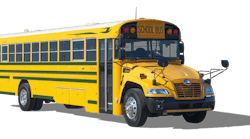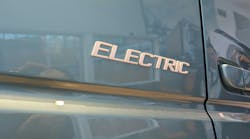Manager: Pat Mitchell
Title: Director of transportation
Fleet: Mobile County Public Schools, Mobile, AL
Operation: A 1,500-unit fleet with a mix of school buses (740 in all), cars and light trucks.
Problem:
Switching to an alternative fuel always poses challenges for any fleet operation. Pat Mitchell will tell you those challenges are amplified when the cargo you carry every day are 26,000 school children ranging in age from kindergartners to high school seniors.
So when Mobile County Public Schools (MCPS), Alabama’s largest school district, decided to acquire 30 propane-powered Blue Bird school buses equipped with the Roush CleanTech fuel systems as opposed to diesel, vehicle safety took precedence.
“We had to establish first and foremost that propane buses would be as safe if not safer than our diesel buses,” explains Mitchell, now in his fourth year serving as director of transportation for MCPS.
“We took a year and one-half performing our due diligence, getting buy-in from our superintendent, the school board, and our drivers,” he says. “We did an awful lot of homework to sell them all on the safety of these buses. We needed to prove the children would be safe for a lot of eyes are watching us.”
There was another issue to deal with as well: completing the changeover with little to no disruption.
Solution:
Mitchell’s career includes 21 years in law enforcement, rising from beat cop to assistant police chief. Safety concerns were the first to be addressed, he says. Once MCPS surpassed the vehicle safety hurdle, the cost savings came into play.
“We had to show that not only would we be saving money, but that money would go back to the classrooms,” Mitchell stresses. That proved relatively easy, especially with propane costing $1.20 to $1.30/gal. compared to $3.40/gal. for diesel. For a fleet spending $3 million to $4 million on fuel, that fuel price differential meant a lot more money would indeed be going back to the classroom.
Making a “smooth switch” to propane buses then became a top priority for Mitchell. He did not want drivers and parents alike to resist the use of these buses. So, in order to avoid any problems in the first few days of operation, he hit upon the idea of making a video highlighting the particular needs of propane bus care and operation. In this way, he could broadly educate MCPS’s fleet personnel, followed by a hands-on training event.
“Propane buses operate a little differently than our diesel units,” he stresses. “For example, the engine doesn’t turn over immediately after you turn the ignition key. You need to turn it to the ‘on’ position, wait for a cycle, and then the engine starts on its own.”
Refueling MCPS’s propane buses also posed its own set of idiosyncrasies, as the refueling port cap and door cover have to be closed tightly or the engine will not start. “That’s a safety feature,” Mitchell says, noting that Blossman Gas, the school district’s propane fuel provider, brought actual propane refueling equipment to the hands-on demonstration site to help train MCPS’s fleet personnel.
Mitchell adds that he went to such lengths in order to ensure that when those propane buses hit the road for their first week of operation, MCPS’s 30 mechanics weren’t making road calls for such issues. “These propane buses are so similar in style to gasoline-powered units that it was never a stretch for our mechanics to learn how to maintain them,” he emphasizes. That’s why MCPS focused its propane education effort on troubleshooting small issues that could potentially leave a bus, and children, stranded on the side of the road.
“We demonstrated all of that and more in our video and hands-on demonstration not only for our drivers and technicians but substitute drivers as well,” he points out. “That helps us continue to provide dependable yet cleaner student transportation while saving taxpayers money so we can put it back in the classroom where it counts most.”



